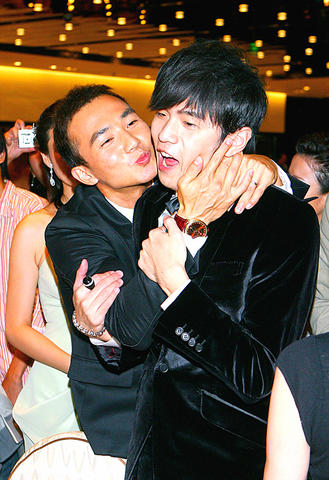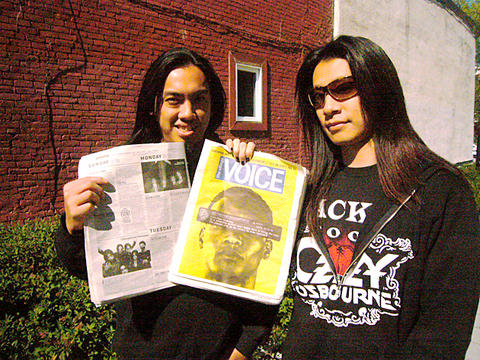This week's celebrity news features Jay Chou (周杰倫). Delayed by Typhoon Krosa at Hong Kong airport, the pop king rushed to the wedding of local singer Will Liu (劉耕宏) - most famous for being the king's buddy - to beauty queen-turned starlet Wang Wan-fei (王婉霏). He arrived at the NT$23 million ceremony, which was fully sponsored by celebrity friends and multiple businesses, at the last minute on Sunday evening.
In addition to the star-studded, attention-grabbing nuptials, the Liu-Wang union is a modern fairytale, if not plain fable. During the last four years of their eight-year relationship, the Christian convert couple claim to have stuck to a vow of chastity.
No sex for 1,460 days? It's difficult to imagine why anyone would make up such a scenario and Pop Stop would like to refrain from making any innuendos, but hopes the newlyweds enjoy their honeymoon destination, Hawaii, and the earth moves for them.

PHOTO: TAIPEI TIMES
In other Chairman Chou (周董) news, the Mando-pop star donned a cowboy outfit for his latest album Jay Chou on the Run (我很忙), and unwittingly became a rent boy. According to Chinese-language media, a Web user under the name of Jack is using Chou's photos to peddle sexual services on an English gay Web site, with a pitch line referring to a "large and uncut tool." The service fee is US$85 per hour and around US$400 a night.
That snippet of news and the cowboy look coincide with the star's recent pronouncement in an interview that if he were a woman, he would fall in love with Wang Lee-hom (王力宏), who is talented, upright and honest.
Those two would make a toothsome couple Pop Stop has to admit.

PHOTO: TAIPEI TIMES
Following in the footsteps of his very "close friend" Lin Chi-ling (林志玲), Jerry Yan (言承旭) is eyeing the silver screen again. The first time around, he starred in an obscure romantic comedy Magic Kitchen (魔幻廚房). That was three years ago. Yan's reentry into the coveted movie biz is most likely to be grand and in style as the star was last week caught by paparazzi attending a dinner meeting with not one but three doyens of Hong Kong's cinema industry: Stanley Kwan (關錦鵬); Wong Kar-wai (王家衛); and William Chang (張叔平).
Gossip hounds staking out the joint caught the heartthrob off guard as he walked out of the restaurant after six hours of eating, drinking and getting acquainted with the showbiz movers and shakers. Swiftly escorted and pushed into a car by his escort/agent, Yan disappeared into the night, leaving pundits to ponder the star's next move.
Death metal brand Chthonic (閃靈) has become the nation's new pride and joy after its two-month tour of the US spreading the pro-independence message to the foreign press. Their musical and diplomatic adventure will be made into a documentary by Cheng Wen-tang (鄭文堂), which is expected to hit the international film festival circuit next year.

Currently, the outfit is busy with preparatory work before it departs again, this time to rock Europe with 30 gigs starting next month. One of the concerns raised by the band's erhu player, Su Nung (甦農), however, is not something normally expected from a heavy metal group.
After losing a great deal of money on the stock market during his absence, the artist said a major problem that needs to be solved is how he can stay in touch with his stockbroker while he's globetrotting.

On April 26, The Lancet published a letter from two doctors at Taichung-based China Medical University Hospital (CMUH) warning that “Taiwan’s Health Care System is on the Brink of Collapse.” The authors said that “Years of policy inaction and mismanagement of resources have led to the National Health Insurance system operating under unsustainable conditions.” The pushback was immediate. Errors in the paper were quickly identified and publicized, to discredit the authors (the hospital apologized). CNA reported that CMUH said the letter described Taiwan in 2021 as having 62 nurses per 10,000 people, when the correct number was 78 nurses per 10,000

As we live longer, our risk of cognitive impairment is increasing. How can we delay the onset of symptoms? Do we have to give up every indulgence or can small changes make a difference? We asked neurologists for tips on how to keep our brains healthy for life. TAKE CARE OF YOUR HEALTH “All of the sensible things that apply to bodily health apply to brain health,” says Suzanne O’Sullivan, a consultant in neurology at the National Hospital for Neurology and Neurosurgery in London, and the author of The Age of Diagnosis. “When you’re 20, you can get away with absolute

May 5 to May 11 What started out as friction between Taiwanese students at Taichung First High School and a Japanese head cook escalated dramatically over the first two weeks of May 1927. It began on April 30 when the cook’s wife knew that lotus starch used in that night’s dinner had rat feces in it, but failed to inform staff until the meal was already prepared. The students believed that her silence was intentional, and filed a complaint. The school’s Japanese administrators sided with the cook’s family, dismissing the students as troublemakers and clamping down on their freedoms — with

As Donald Trump’s executive order in March led to the shuttering of Voice of America (VOA) — the global broadcaster whose roots date back to the fight against Nazi propaganda — he quickly attracted support from figures not used to aligning themselves with any US administration. Trump had ordered the US Agency for Global Media, the federal agency that funds VOA and other groups promoting independent journalism overseas, to be “eliminated to the maximum extent consistent with applicable law.” The decision suddenly halted programming in 49 languages to more than 425 million people. In Moscow, Margarita Simonyan, the hardline editor-in-chief of the